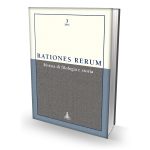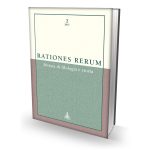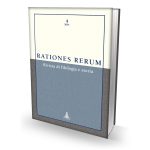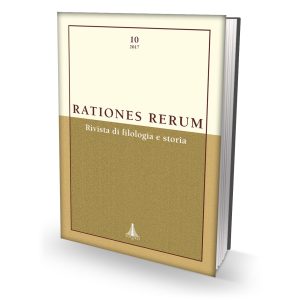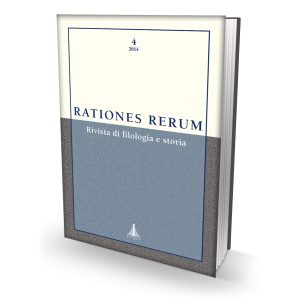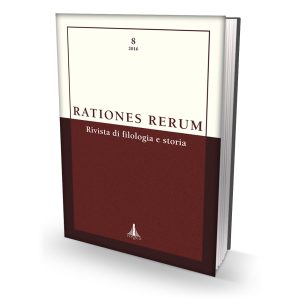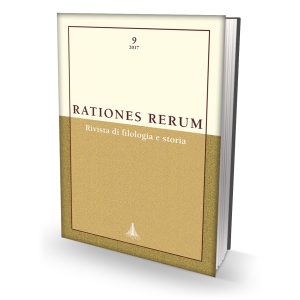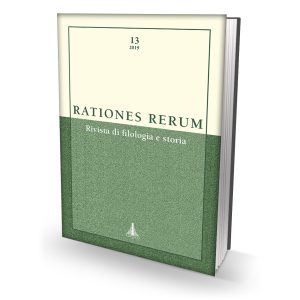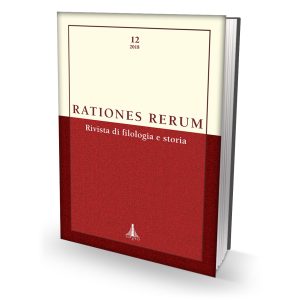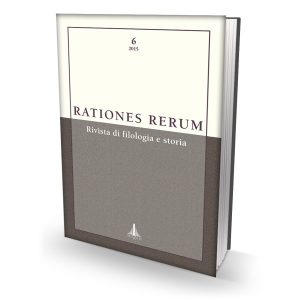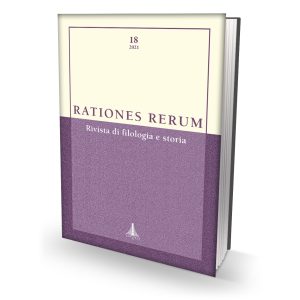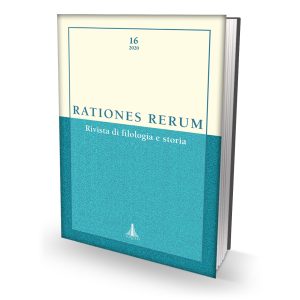RATIONES RERUM 3 – Rivista di filologia e storia
40,00 €
Autori vari
Anno edizione: 2014
Formato 17×24 – Pagine 280
Confezione a filo refe in brossura
Copertina a 2 colori con bandelle
ISBN 9788888617756 – ISSN 2284-2497
Prezzo: € 40,00
- Descrizione
- ANTEPRIMA
- ABSTRACTS
Descrizione
Sommario
Werner Eck, Milites et pagani. La posizione dei soldati nella società romana, p. 11
Massimo Di Marco, L’Epitafio di Filita (ap. Ath. 9, 401E = Anon., FGE 134), p. 55
Ferdinando Ferraioli, Riflessioni su Aristotele, fr. 483 Rose, p. 73
Pietro Zaccaria, Alessandro Magno, Eracle e Cos Meropide (Strabo 15, 1, 3; 33. Plin., NH 6, 59), p. 93
Alessandro Fusi, Su un distico attribuito a Marziale (Epigr. 37 Sh. B., 33 Lindsay), p. 107
Guido Migliorati, Il ius nella Historia Augusta, p. 141
Claudio Giammona, Declinationes e Ars Ambianensis. Un trattato elementare approdato in età carolingia, p. 157
Antonella Amico, «I buoni storici sono cattivi romanzieri»? Il sogno letterario di Gaetano De Sanctis (parte seconda), p. 191
Recensioni
Federica Cordano, rec. a D. Baldassarra, Dal Saronico all’Adriatico. Iscrizioni greche su ceramica del Museo Nazionale di Adria [Pisa, ETS, 2013], p. 229
Virgilio Costa, rec. a F. Muccioli, Gli epiteti ufficiali dei re ellenistici [Stuttgart, Franz Steiner Verlag, 2013], p. 232
Leopoldo Gamberale, rec. a G.B. Conte, Ope ingenii. Esperienze di critica testuale [Pisa, Edizioni della Normale, 2013], p. 239
Maria Accame, rec. a M. Feo, Persone. Da Nausicaa a Adriano Sofri [Santa Croce sull’Arno, Il Grandevetro, 2012, 2 voll.], p. 251
Cronache
Eugenio Lanzillotta, Presentazione di «Rationes Rerum» e prima esecuzione nell’ambito del Progetto Archilochus, p. 263
Libri ricevuti, p. 271
Abstracts, p. 273
Indice analitico, p. 277
Werner Eck
Milites et pagani. La posizione dei soldati nella società romana
pp. 11-54
During the Roman republic there was no difference between civis and miles. But with the creation of the permanent army under Augustus the world of the milites was more and more separated from the world outside the castra. Only then the antithesis soldier versus civilian could arise. The civilians are the people living outside the military camps in the pagi, called pagani = civilians. Of special importance was the prohibition for soldiers to marry during the service. To balance this exclusion from the civilian life the emperors granted soldiers and veterans special privileges. Of extraordinary importance was the grant of the Roman citizenship to the auxiliaries thereby promoting the integration of many soldiers in the local Roman societies.
Massimo Di Marco
L’epitafio di Filita (ap. Ath. 9, 401E = Anon., FGE 134)
pp. 55-71
In the epitaph ascribed to Philitas there is no need to emend the transmitted text, or to force the meaning of the extravagant expression “evening night-worries”, whose obscurity is consciously aimed at. The author proposes an absolutely fictitious example of the kind of expressions Philitas, as grammatikós, was interested in. In this perspective, the reference to the eristic “Liar’s paradox” functions as a hyperbolic pendant: the Coan erudite’s efforts to understand the true meaning of the ataktoi glossai (“disorderly words”, according to Bing’s brilliant interpretation) are humorously assimilated to the attempts to solve the famous sophisma attributed to Eubulides of Miletus.
Ferdinando Ferraioli
Riflessioni su Aristotele, fr. 483 Rose
pp. 73-92
This paper presents some remarks about a fragment of Aristotle’s koine politeia of the Arcadians concerning the assembly of the Ten Thousand at Megalopolis. It focuses on the meaning of the expression koine politeia and the problem of the structure of the politeiai of Greek ethnic/federal states. Concerning the first issue, it is emphasized that the expression koine politeia should probably be interpreted as federal politeia. In relation to the second issue, since the Ten Thousand are an institution dating back to the foundation of the Arcadian confederation, and since they were mentioned at the beginning of Aristotle’s work, it is possible to conjecture that the politeiai of Greek ethnic/federal states started when the koinon was established.
Pietro Zaccaria
Alessandro Magno, Eracle e Cos Meropide (Strabo 15, 1, 3; 33. Plin., NH 6, 59)
pp. 93-106
According to an information reported by Strabo and Pliny the Elder, in India Alexander conquered 5,000 cities not smaller than Cos Meropís. A study of the versions of the myth of Herakles at Cos suggests that this allegation was fabricated by Alexander’s propaganda with the aim of comparing his deeds to those of Herakles.
Alessandro Fusi
Su un distico attribuito a Marziale (Epigr. 37 Sh. B., 33 Lindsay)
pp. 107-140
Epigr. 37 Sh. B., a ferocious attack against Domitian, guilty of having brought discredit on his gens, is the only poem, in Martial’s corpus, exclusively preserved by indirect tradition, within Juvenal’s scholia vetustiora. Since Scriverius’ first edition (1619), it is printed at the end of the Liber spectaculorum, in spite of the patent incoherence of such ecdotic behavior. The distich’s composition date is unanimously placed after the assassination of Domitian (96 CE), and Martial’s authorship is generally accepted. However, a careful evaluation of Martial’s poetic strategies after Domitian and a close analysis of the distich show this attribution to be highly unlikely.
Guido Migliorati
Il ius nella Historia Augusta
pp. 141-155
The Historia Augusta has unique expressions like ius praetorium, ius praesidum or praesidale. The epigraphic evidence about the new military leaders established by Gallienus shows that this vocabulary was born as a consequence of the difficulty of clearly defining the attributions of the new praesides respect to the legati Augusti (former magistrates) and the praefecti (equestrian procuratores provided with full jurisdictional powers).
Claudio Giammona
Declinationes e Ars Ambianensis. Un trattato elementare approdato in età carolingia
pp. 157-189
The paper offers a general survey on the teaching of Latin in the Early Middle Ages and presents some topics – like the declensions and conjugations – not covered by the Latin grammarians. Special attention is reserved to the so-called Ars Ambianensis, an introductory handbook of Latin that has often been described as a mere “outline”; however, a closer analysis to the extant versions shows that the original redaction was much more complex.
Antonella Amico
«I buoni storici sono cattivi romanzieri»? Il sogno letterario di Gaetano De Sanctis (parte seconda)
pp. 191-227
This is the second part of an essay about the still unknown literary activity of Gaetano De Sanctis as a novelist. It highlights some of the themes (in particular faith and freedom) of his tales.


